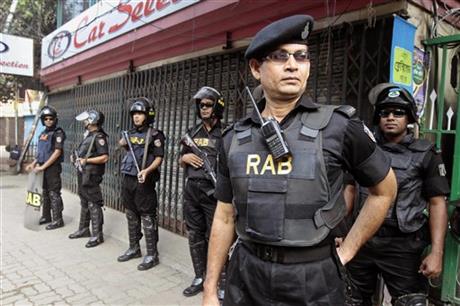
By JULHAS ALAM
Members of Bangladesh Rapid Action Battalion (RAB) stand guard on a street outside the office of the main opposition Bangladesh Nationalist Party (BNP) during a general strike in Dhaka, Bangladesh, Monday, Nov. 4, 2013. Security was heightened across the capital, Dhaka, with extra police and paramilitary guards patrolling the streets. The opposition began a three-day strike to force the government to step down. (AP Photo/A.M. Ahad)
Bangladesh Opposition Protest
Main opposition Bangladesh Nationalist Party (BNP) lawmakers shout slogans in the premises of the Parliament during a general strike in Dhaka, Bangladesh, Monday, Nov. 4, 2013. Security was heightened across the capital, Dhaka, with extra police and paramilitary guards patrolling the streets. The opposition began a three-day strike to force the government to step down. (AP Photo/A.M. Ahad)
Prev
1 of 2
Next
DHAKA, Bangladesh (AP) — Fresh clashes erupted during a strike by Bangladesh’s political opposition Tuesday, confining residents to their homes and leaving them increasingly frustrated with the chaos in the streets.
“We need to go to office, we need to work,” said mobile phone company owner Abdus Salam, who was waiting for a bus in the capital. “The politicians do not think of us, they are obsessed with their own gains.”
Extra police and paramilitary guards were on Dhaka streets, and schools and shops were closed, while long-distance public buses stayed off the streets fearing attacks by the protesters. Authorities rescheduled examinations for hundreds of thousands of students.
The nationwide strike is meant to force the government of Prime Minister Sheikh Hasina to quit so a neutral caretaker government can be formed to oversee upcoming elections. At least 18 people have been killed since Oct. 26 in the violence stemming from the political crisis.
On Tuesday, opposition activists clashed with police in northwestern district of Rajshahi, leaving at least 25 people injured, Somoy TV station reported. It said three activists were detained.
Separately, ruling Awami League activists clashed with the opposition supporters in central Bangladesh’s Munshiganj district, leaving scores injured, Channel 24 station reported. It said police fired rubber bullets, leaving at least 10 people injured in the area, which is 32 kilometers (20 miles) south of Dhaka.
Local newspapers published blurred photos of people who got burned in arson attacks during strike.
Dhaka’s leading English-language Daily Star newspaper published a story along with such a photo of a teenager, whose most part of the body got burned, with a headline: “In the name of politics, this is what they do to people.”
On Monday, the first day of the 60-hour strike, two people died and scores of others were injured as protesters set off homemade bombs and torched cars.
The protest comes as a Dhaka court sentenced 152 border guards to death involving a 2009 mutiny at the headquarters of the country’s border guards. At least 74 people, including 57 military officials, were killed in the mutiny.
The latest violence comes at a time of deep tension in Bangladesh, a nation struggling to overcome extreme poverty, rancorous politics and a string of horrific accidents linked to the garment industry.
The election, expected in January, has become a flashpoint in the decades-old rivalry between Hasina and the opposition leader, Khaleda Zia.
The opposition says Hasina’s government is not capable of holding a credible election and wants a neutral administration from outside the political parties to oversee the vote. Hasina has agreed to form a caretaker government, but with members of the ruling and opposition parties.
On Tuesday, Cabinet minister Obaidul Quader said all the Cabinet members would submit their resignation within seven days, an announcement that demonstrates that the government would go for a caretaker government to hold the elections even if main opposition does not come forward.
In addition to the election-related violence, a war crimes tribunal stemming from Bangladesh’s 1971 war of independence from Pakistan has become another incendiary political issue.
Hasina formed the tribunal in 2010, but most of those on trial are members of Jamaat-e-Islami, an Islamic party allied to the opposition. Zia says the trial is politically motivated.
The latest verdict came Sunday against two people.
Bangladesh says Pakistani soldiers and local collaborators killed 3 million people and raped 200,000 women during the 1971 war.



